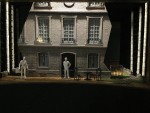Title

Charlie Corcoran, who since 2011 has designed sets for four operas at Juilliard, all of which were directed by Stephen Wadsworth, was responsible for the 'Katya Kabanova' scenic design.
Stephen Wadsworth appeared to be meditating as he leaned over his desk on a recent Saturday afternoon. He was studying the score to Leoš Janáček's Katya Kabanova, which concludes Juilliard's opera season with three performances that Wadsworth will direct. But Katya (for short) is only one of several projects Wadsworth had on his mind. He runs and teaches in Juilliard's postgraduate Artist Diploma in Opera Studies program and is also head of dramatic studies for the Metropolitan Opera's Lindemann Young Artist Development Program. He had just spent two weeks working with Juilliard drama students on a project. And he always seems to be working on several directing projects.
Body
But first comes the 1921 Katya, which Wadsworth describes as “a funny piece because it's a mid-19th-century Russian play that was turned in to an opera by a 20th-century Czech modernist, who was also someone who had a sort of expressionist sensibility about certain things, but who was extremely interested in the issue of tradition and the preservation of Moravian culture.”
The opera will be performed in English using a translation by Czech opera expert Yveta Synek Graff. Using the English translation will be a major help to the singers and audience, but Wadsworth and conductor Anne Manson will still have their work cut out for them in guiding the musicians through Janáček's score. One of its challenges is the jagged and wide-ranging melodic lines that Janáček wrote to accommodate the rhythmic and melodic idiosyncrasies peculiar to spoken Czech. The score is also filled with colorful orchestral textures, compelling folk-inspired rhythmic motives, and mercurial harmonic language.
The story is set in the provincial village of Kalinov, where the beautiful, young Katya (sung by soprano Felicia Moore), who's married to the boozey Tichon (tenor Miles Mykkanen), falls for the visiting Boris (tenor Gerard Schneider). But even though Tichon is away, there are plenty of people to disapprove, chiefly the rich merchant Dikoj (bass Alex Rosen) and Katya's mother-in-law, the grumpy widow Kabanicha (contralto Sara Couden). Alas, Tichon's earlier-than-expected return throws Katya into hysterics, and following a dramatic confession of her affair, she hurls herself into the Volga River.
The Juilliard production, Wadsworth said, will “honor the tension between the folkloric and the modern because I think it's one of the driving arguments of the opera.” A proscenium arch with a folkloric decoration (Janáček's stage directions called for the passageway of a building whose walls “are covered with religious paintings, now fading and flaking, of sinners being cast into Hell”) evokes tradition, while on the modern side, Wadsworth will blend outdoors and indoors in such a way that characters in a shared environment seem to be in different places.
Wadsworth's ingenuity and tact in lending a modern take to something traditional and revered—as he did, for example, with his cycle of wing-and-border Mozart-Da Ponte productions at Juilliard from 2012 to 2015—puts him in step with Janáček. “It is a piece that I love,” Wadsworth said of Katya. “Janáček is one of the greats.”





